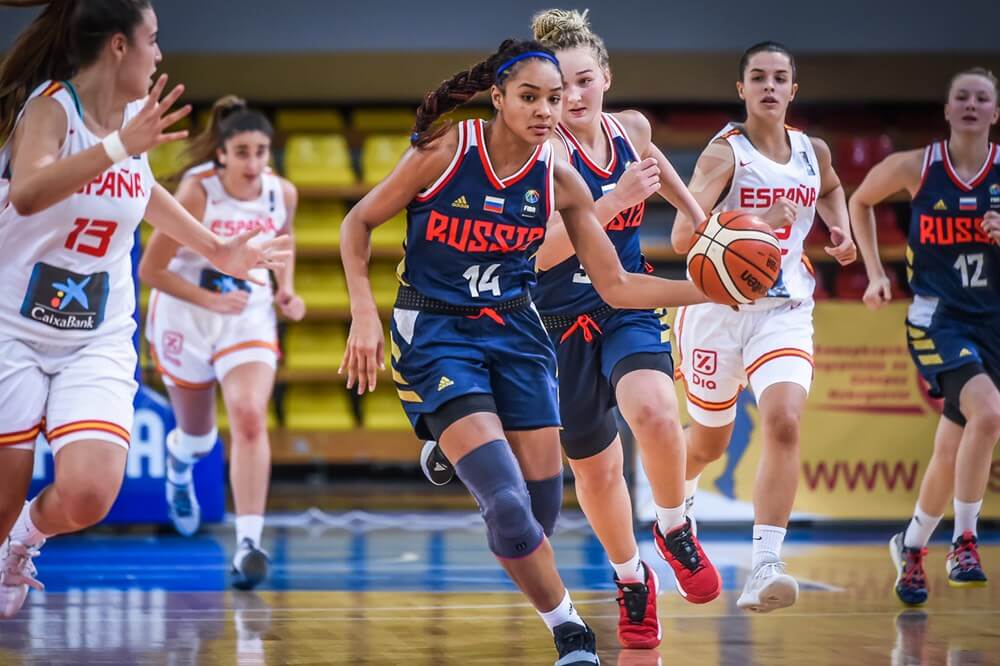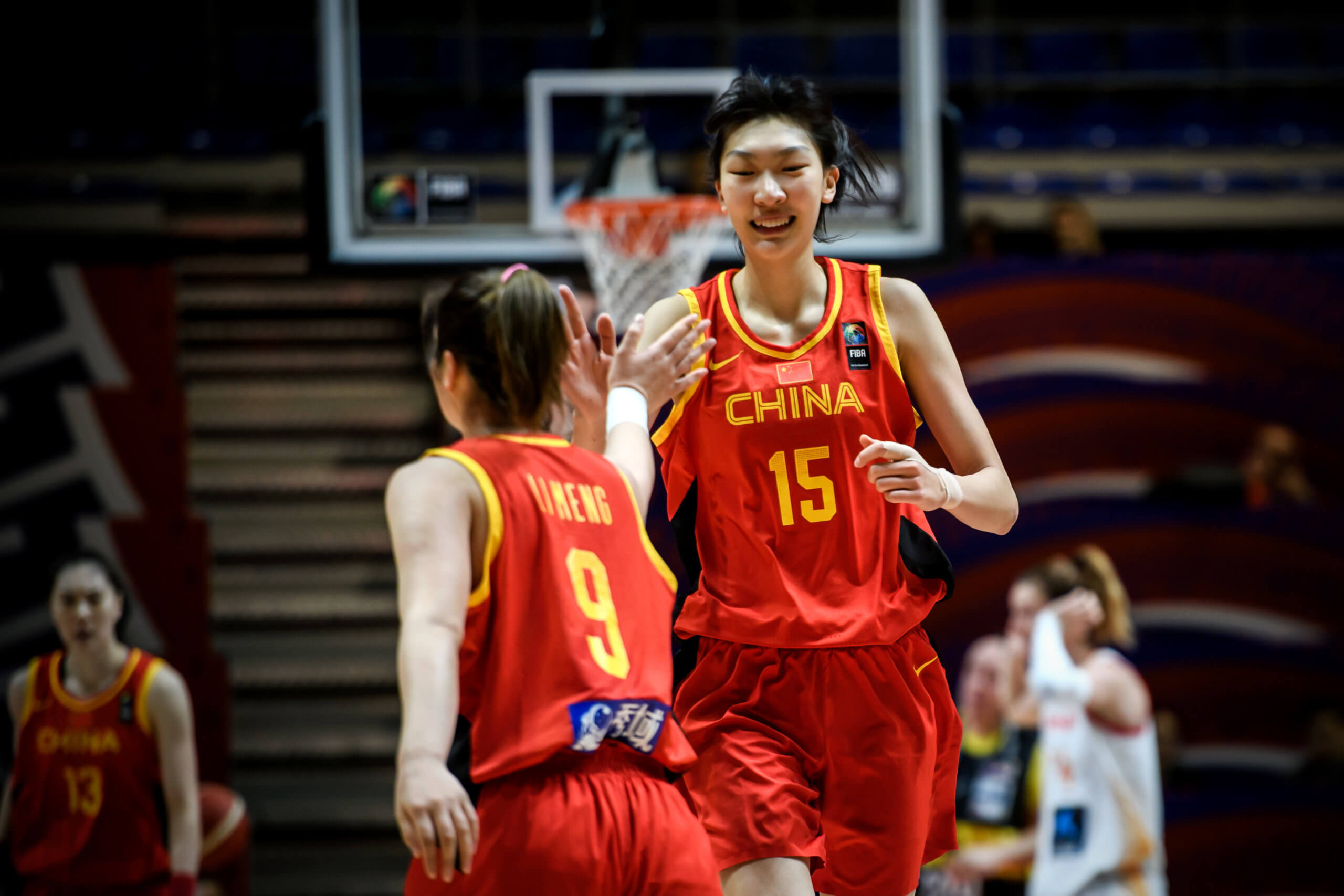Picking up the baton from my esteemed Blue Star Media Pierre Ploszajski who attended the 2017 edition, it was my pleasure to attend the third Memorial Juan De Mena Torneo – a competition for four teams across three days, which has become an annual December event.
Taking place in Zamora, Spain, which is a 90-minute train ride from the capital Madrid, the event took place in a location which has a tradition of women’s basketball with the locals able to support a top-tier Liga Femenina pro-team.
As well as a new representative from Blue Star media, the tournament had two new competitors as well. Joining the familiar faces of Spain and the regional hosts (and only non-international team) Castilla Y Leon, were Germany and Russia (with Italy and Turkey having been the visitors in 2017).
Day 1 from Zamora, Spain 🏀♀️🏀
Some nice U16 action from @baloncestofeb @russiabasket @DBB_Basketball Castilla y Lyon
2003, 2004 and even 2005 born talent… 👀
🎥for @BlueStarMedia1 #FIBAU16Europe pic.twitter.com/NaHGH9NBhl
— @Basketmedia365 🏀♀️🏀Paul Nilsen 🌈 (@basketmedia365) December 6, 2018
In essence, this tournament is to prepare international teams for the 2019 FIBA summer and specifically, #FIBAU16Europe .On this topic, there was a sprinkling of players on show had experienced during 2018 in Kaunas, Lithuania when playing ‘young’ (2003).
They will of course, now be the senior players during 2019, with those participating in Zamora also made up of 2004 and even a couple of 2005 competitors.
1ST Spain (3-0)
Spain v Castilla y Leon 78-51 (W)
Spain v Russia 65-50 (W)
Spain v Germany 70-37 (W)
Summary
It was a typical Spanish team and they were worthy winners, although I have to confess the displays were tinged with some disappointment in terms of a lack of ‘star players’ or big (obvious) future talents. At this stage of course at 2003 and 04 players, there is some distance to travel, but outside of the terrific Gisela Sanchez (more on her below), I was still scratching my head as to who will be the players to mount a podium challenge next year at #FIBAU16Europe.
Sanchez was one of three 2003 players who competed in Kaunas several months ago, with Chisomaga Okaford back, but not playing a major role in truth, while Marta Morales was missing.

Spain had all the ingredients that have become traditional. They had no real outstanding athleticism, but the ability to move the ball more quickly and effectively than their rivals can cope with is always gold – as is, their effectiveness in transition and capitalizing on errors. I admit I am being hyper-critical above saying I was disappointed, because from a team perspective, they were outstanding as usual. The power coming from that team-ball ethic which I admire very much and you can’t knock the stylish blueprint that Spanish teams at all levels continue to follow.
Notable Players
Sanchez looked like the 18-20 year old playing with 15-16 year olds. The maturity of the small forward in so many aspects is at another level now to her peers. Her height, the economy of movement, the ability to shoot from range, but also those little pull-up jump shots as well as slashing to the hoop are so nice. I also like the other aspects of her game such as her awareness on court of key situations and work off the ball. Defensively sound as well, surely Sanchez is All-Star Five material next year at #FIBAU16Europe.
Outside of the obvious, there was nobody else who I got hugely excited about, although it was clear the likes of Elena Rodriguez for example is a very good asset and can push on her game to become a big contributor.
2nd Russia (2-1)
Russia v Germany 69-38 (W)
Spain v Russia 65-50 (W)
Castilla y Leon v Russia 49-56 (W)
Summary
They started slowly with an awful first quarter against Germany, but then caught fire and won that opener in convincing fashion. While they lost against Spain, they gave their opponents a really tough encounter after another slow start, with the 15-point final margin, arguably not a true reflection of the game. Their win against Castilla y Leon was unconvincing on the last day, although considerable mitigation was finishing on Friday night then being back out at 10am the next morning.

Overall, it was a very impressive Russia team who could make a splash next year at #FIBAU16Europe. This team had no returnees from Kaunas this past summer and overall, they had 2-3 very capable players who look like giving them a very strong foundation. They played hard like most Russia teams, moved the ball quite well to find open shooters and made nice decisions in the main considering their age. Veteran coach Liudmila Kormenkova rotated well and I think they can be hugely satisfied with their 3 days of work.
Notable Players
I can not emphasize enough how exciting it was to see Anastasiia Olari Kosu in the flesh. She is possibly the most athletic Russian player I have ever seen – at any level. A big statement I know (doesn’t equate to the best of course) but it was amazing to see some of her shot blocking ability. She announced her arrival going 10 of 11 against Germany and while she did not continue that red-hot shooting form, her upsides continued to shine through. She is not huge, but her leaping ability, quick hands and quick feet give her huge advantage in the post for spin moves to the bucket and dominating on the glass.
Play of Day from opening games of Zamora U16 Tournament!
WHAT a chase back ⛔️ this was @russiabasket
Want to see more Friday, Saturday and at 2019 #FIBAU16Europe please @fiba
😍😍 @BlueStarMedia1 😍😍#EuroLeagueWomen #EuroBasketWomen #EuroCupWomen #FIBAU17 #FIBAU19 pic.twitter.com/phECno0WXK
— @Basketmedia365 🏀♀️🏀Paul Nilsen 🌈 (@basketmedia365) December 7, 2018
Throw in her energy and footwork defensively and she is a power at both ends of the court. She plays hard and what I liked most is that she did not try and block every shot or over extend on defense, she looks to have a good basketball IQ and therefore all the elements to be a big success. After this tournament double-double, I can’t wait to see her evolution. I really hope to see her as part of a senior rotation with Raisa Musina and Masha Vadeeva in 5-6 years! Long way to go, but the jigsaw pieces are mostly there.
Outside of that, I did like forward Anastasiia Odintcova who was a real glue player. Not huge skill or flair, but all the hard work and elements that coaches and teammates rely on. She doesn’t have a lot of athleticism, but I was impressed with her smarts she was a nice sidekick to the more dynamic Olari Kosu.
3rd Castilla y Leon (1-2)
Spain v Castilla y Leon 78-51 (L)
Germany v Castilla y Leon 48-56 (W)
Castilla y Leon v Russia 49-56 (L)
Summary
The only non-international team in the tournament, Castilla y Leon did well and were basically a diluted version of Spain as you could perhaps anticipate. With a similar approach, mentality, if not at the same level, the win against Germany was memorable and the final margin flattered their opponents. Additionally, the really did give Russia a big scare and could have completed a double scalp of international teams!

Notable Players
Castilla y Leon were packed with very serviceable and reliable players who had solid fundamentals, but it was the very assured Ines Santibanez Herrera who was the class act. The guard would not have looked out of place in the Spain team. It was clear the game comes very easily to her. Her court awareness, dribble, passing and footwork were all evident and she can score too. She had 8 steals against Germany and basically spent her time causing her opponents headaches and asking big questions.
4th Germany (0-3)
Germany v Castilla y Leon 48-56 (L)
Russia v Germany 69-38 (L)
Spain v Germany 70-37 (L)
Summary
On the surface, Germany have a long way to go if they want to challenge next year at #FIBAU16Europe on this evidence. Their biggest issue is that they just don’t have any real go-to players or consistent scorers. When you throw in the fact there was a palpable lack of aggression and a questionable mental toughness when placed under pressure – for example a pressing defense (they crumbled) it is worrying for them.
It must have been frustrating for head coach Stefan Mienack who missed the first game against Russia but was back for the second game against Castilla y Leon to see his side get beaten by a Spanish provincial side. He was making history winning #FIBAU18Europe only a few months ago in Udine. To put their lack of offensive threats into perspective, they caught Russia cold during the very first quarter of the tournament when they scored 19 points.
Then, incredibly, they scored only 35 points across the next FIVE quarters. No real big scorers, no consistent inside presence and the bulk of the team weak with the ball in the hands as a unit is a bad cocktail. Work to do and certainly no kind of talents easily recognisable of the calibre of those who won that gold at U18 this summer.

They played 120 minutes in Zamora and over 100 were poor and frustrating. The first 15 minutes against Spain was impressive – but I am not sure if that was jointly due to the shortcomings of their opponents. Once Germany stopped doing the simple things well, it was curtains closed!
However, despite some gloom, there is an important caveat. Coach Mienack explained to me that a decision had been made to only field 2003 players and basically separate out the 2004 generation who will travel to Bourges for the U15 tournament next weekend. The rationale is that they didn’t want younger players to be only role players in Zamora and they wanted to see what they could do against their own age group – something that will facilitate the selection for next year’s #FIBAU16Europe. With this in mind, it does put these results in Zamora into a better context. However, they must be hoping they have plenty of 2004 talents to bring in, since the depth is not great in terms of 2003.
A footnote to this is also that Germany as a Federation have their busiest youth summer next year when they will debut at the FIBA U19 Women’s Basketball World Cup – in addition to the usual European tournaments. So, much planning is in process to balance the rigorous demands and it will be interesting to see if they keep their status in the respective A Divisions through the age groups.
Notable Players
From #FIBAU16Europe in Kaunas this year, Germany had 2003 born trio Lina Sontag, Clara Wilke and Praise Egharevba although none covered themselves in any kind of glory as Germany misfired throughout.
Sontag obviously has game as her numbers in Kaunas suggested, but she had a nightmare and there is better to come in the future for her. She was largely cold throughout, but has the physique and fundamentals to still develop nicely. She is not a scorer anyway, but does have a lot of good all-around elements and she will be back stronger for this disappointment.

Wilke I quite like in that she is the one German player who did play aggressively and with energy. I like her handles and passing one handed to give her team-mates an advantage is pretty much automatic now. She didn’t shoot well, but will always be a main threat within this team and probably just needs to work out and solidify ‘her shot’ from a couple of spots on the floor. She also needs to probably stop trying to force it and over-dribble, but in these tough circumstances, it was understandable.
Egharevba did some damage in the second game with a double-double of 11 points and 13 rebounds against Castilla y Leon but did struggle to impose herself on all games in reality. However, the basis is there and some aggressive fighting for better position would probably help her enormously – along with the development of an effective pump-fake.
Outside of those featured at FIBA events already I think there is possibly a baller in point guard Martha Pletson. Her handles are impressive, she plays decent defense and is tenacious. She can create and if she works incessantly on her perimeter game and jump shot, then she could be decent. Long way to go in the hardest spot on any floor of course. Her numbers don’t suggest anything huge ahead, but she was my pick as a possible late bloomer for Germany.
Make sure you follow @Basketmedia365
Paul Nilsen lives and breathes women’s hoops. He’s is a freelance writer working for the sport’s world governing body FIBA where he pens a weekly ‘Women’s Basketball Worldwide Column’ - as well as providing daily content on major club competitions, international tournaments and the women’s youth game. He has an extensive network of contacts across the globe, including an array of elite play-callers and players. Also a qualified coach and referee, he is a big supporter of Blue Star Media and joined as a blogger during the fall of 2016.




